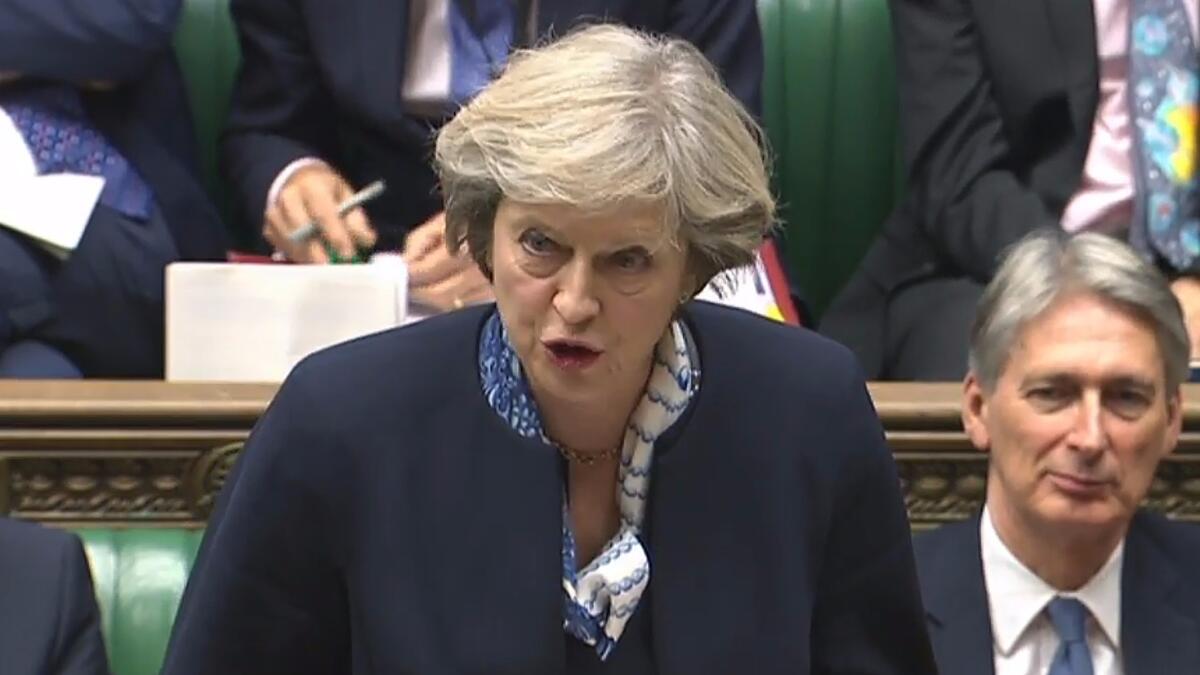British lawmakers press May government for details on breaking from European Union

Reporting from London — British government officials faced fierce criticism Wednesday for their handling of the country’s pending withdrawal from the European Union, with lawmakers demanding details about what may come next to prevent economic turmoil and job losses.
Members of Parliament from across the political spectrum pressed Prime Minister Theresa May and her Conservative Party for the right to scrutinize the terms of the so-called Brexit negotiations.
“In negotiating our future relationship with the European Union the government will be defining the future of our country, so the terms matter greatly,” said Keir Starmer, the opposition Labor Party’s Brexit secretary.
Labor Party leader Jeremy Corbyn accused May of overseeing a “shambolic Tory Brexit.”
May has said Britain would invoke Article 50 of the Lisbon Treaty by the end of March, which would launch a two-year process resulting in the country’s exit from the 28-nation bloc by summer 2019. However, she has declined to share details about plans for negotiations with the EU.
Politicians who campaigned for the failed “Remain” side in a June 23 referendum on whether Britain should leave the EU argued that while they accepted the result of the vote, they did not believe that gave the government an automatic right to dictate what that exit should look like.
In total, 72% of the electorate voted in the referendum, with 17.4 million (52%) favoring leaving and 16.1 million (48%) voting to remain. The campaign caused deep rifts within the country and stoked fierce anti-immigration sentiments given that a core element of being an EU member is the free movement of people.
In a sign of the ongoing divisions that threaten to consume British politics in the coming months, many pro-”Leave” lawmakers raised concerns Wednesday that calls for greater parliamentary scrutiny of the negotiations was a ruse to delay Brexit indefinitely.
David Davis, the newly appointed secretary of state for exiting the European Union, said that while he welcomed the parliamentary debate, it would not be prudent to give away too much too soon about the negotiating stance.
“It must not be used as a vehicle to undermine the government’s negotiating position or thwart the process of exit,” he said.
The uncertainty over what a post-Brexit Britain will look like has been causing anxiety in the business community and a faltering pound sterling, which recently slumped to a 31-year low against the dollar. There are also concerns that consumers could soon see rises in the price of gas and basic goods on store shelves.
Those fears were further stoked during last week’s Conservative Party conference, when May said she would begin Brexit negotiations no later than the end of March.
May said the country would not seek to retain access to the European single market if that means the country has no control over immigration. Many observers have taken that to mean that Britain might seek a clean break with the EU, or a so-called hard Brexit, rather than a more compromised position.
“The U.K. will be leaving the European Union,” May, who agreed that lawmakers would be able to scrutinize Brexit terms, said Wednesday in the House of Commons. “We’re not asking ourselves what bits of membership we want to retain. We’re saying what is the right relationship for the U.K. to have to maximize the benefits to our economy and citizens of this country.”
Ahead of Wednesday afternoon’s debate, Labor members Starmer and shadow Foreign Secretary Emily Thornberry sent Davis a letter posing 170 questions it had about the EU withdrawal. The number corresponds to the days left before the prime minister’s March deadline for invoking Article 50.
“Concern over freedom of movement must be balanced [against] concerns over jobs, trade and the strength of our economy,” Starmer said during Wednesday’s debate. “Striking this balance … will not be an easy process. We must not give up on the best possible deal for Britain before it’s even started.”
Boyle is a special correspondent.
MORE WORLD NEWS
On the holiest day in the Jewish calendar, bicycles take over Tel Aviv
Terrorism suspect turned in by fellow Syrian refugees found dead in German jail cell
In Hurricane Matthew’s wake, Haiti is left to face an old foe: cholera
More to Read
Sign up for Essential California
The most important California stories and recommendations in your inbox every morning.
You may occasionally receive promotional content from the Los Angeles Times.









